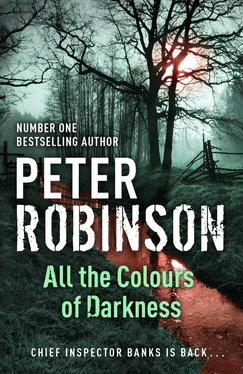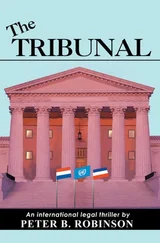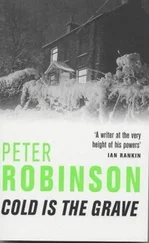“Where’s home?”
“We’re renting a cottage near Lyndgarth.”
“So you don’t live in the area?”
“God, no! We live in South Shields. This is supposed to be a walking holiday.”
Annie glanced around at the dilapidated redbrick terrace houses and the rusted cars on blocks out front. “Not a very good place for that sort of thing, I shouldn’t have thought,” she said. “Unless you’re into urban blight.”
“Not here. Around Lyndgarth.”
“What brought you down here, then?”
“We got lost, that’s all. We had dinner at a pub we read about in the guidebook and took the wrong road. We’re on our way back to Lyndgarth. We didn’t expect to run into this sort of thing in the Yorkshire Dales.”
“Which pub?”
“The Angel Inn, Kilnwick.”
Annie knew the place. They poured a decent pint of Sam Smith’s there. The story made sense. It would have been easy to get lost on the way back through Eastvale from the village of Kilnwick and end up on the East Side Estate. After all, it wasn’t as if there were a wall or a barbed-wire barricade around the place, though sometimes Annie felt there should be, given the number of tourists who complained about getting mugged there.
“Can you tell me exactly what happened, sir?” she asked.
“We were driving down the street and Olivia thought she saw something moving on the waste ground at the end of that passage under the railway lines there. I... well, I wasn’t going to stop, quite frankly, because I didn’t like the look of the place, but it was unmistakable. A person. The white T-shirt. There was somebody on the ground there, rolling, you know, as if he was in pain. At first, of course, we thought it might have been a woman who’d been attacked and raped. There’s such a lot of it around these days.”
“So you stopped to help?”
“Yes. I got out and... well, as soon as I saw the blood I got straight back in the car and phoned the ambulance and police on my mobile.”
“Did you see anyone else around?”
Paxton paused. “I’m not really sure. I mean, it was quite dark, even then.”
“But?”
“Well, I thought I saw a dark hooded figure running up the passage.”
“Dark as in...?” asked Winsome.
“Oh, no,” Paxton said. “No. I’m sorry, I didn’t mean to imply... No. Just that it was in shadow.”
“Male or female?” Annie asked.
“Male, I think.”
“Could you give a description?”
“I’m afraid not. It looked like a largish figure, but I think that might perhaps have been exaggerated by the shadows and the tunnel. But, really, it was too dark to make anything out clearly.”
“I understand,” said Annie. “Did you see anyone else?”
“There were a couple of people walking up that cross street, about a hundred yards away. A man walking his dog. And I got the most fleeting impression... I don’t know, just before we got there and saw the figure on the ground, that there was a group of people sort of scattering.”
“Scattering?”
“Yes. All going in different directions, disappearing around corners and down passageways.”
“Could you describe any of them?”
“No. They were either in the shadows or wearing those hoods like they do these days so you can’t make out their faces.”
“Hoodies?”
“Is that what you call them?”
There were two gangs, if you could call them that, operating on the East Side Estate, Annie had learned: one to the north, centered around the two tower blocks, and the other here, to the south, hanging out around “glue-sniffers’ ginnel.” Though ASBOs abounded on both sides, they had never caused any serious problems outside the odd scrap, graffiti, shoplifting in the Swainsdale Centre and threatening behavior. But the mood had been changing lately; knives had arrived, baseball bats, and there were rumors of heavier drugs coming in from down south and from Manchester.
Paxton’s description of the people he had seen “scattering” from the scene fitted with the kind of uniform the gang members wore, and Donny Moore, the victim, was right up there with them. Most of their names were on file, so they shouldn’t be hard to track down. Whether the police would get anything out of them was another matter. People on the East Side Estate were notoriously closemouthed when it came to talking to the police.
“Did you see anything else?” she asked.
“No,” said Paxton. “I went back to the car and waited. The ambulance was quick. The boy was very still. I thought he was dead.”
“And you saw no one else?”
“That’s right.”
“Okay,” said Annie. “You can go home now. Leave an address with DS Jackman here and we’ll be in touch about a formal statement. It’s just a formality.” She turned to go and talk to the officers on crowd control. The citizens were getting restless for information.
“Thank you,” said Paxton.
As Annie walked away, she heard him ask Winsome, “Er... do you think you could possibly tell me the way to Lyndgarth?”
Annie had to smile. If you want to know the way, ask a policeman. She turned and winked at Winsome, who took the address and gave Paxton directions.
Since his talk with Edwina Silbert, Banks had found himself thinking a lot about the fact that Laurence Silbert had been a spy. He didn’t know very much about the intelligence services, which was probably the way they liked to keep it, but he knew enough to be aware that Silbert might have got up some pretty nasty business and made himself some serious and lasting enemies. And that was just on his own side.
The whole espionage business had changed a lot since the Cold War, Banks knew, and these days you were more likely to get the head of MI5 sending secret memos to CEOs of banks and oil companies about Chinese Internet espionage than anything else. But it wasn’t that long ago since people had been risking their lives to climb over the Berlin Wall. If Laurence Silbert hadn’t traveled much for the past ten or fifteen years, as his mother had indicated, then he had probably done most of his overseas operations before all the major changes in Germany and the former USSR.
Banks decided he might as well read up on it and find out as much as he could, so on Tuesday he had gone to Waterstone’s and bought Stephen Dorril’s MI6 and Peter Hennessy’s The Secret State. He had read Hennessy’s Having It So Good a few months ago and liked his style.
On Wednesday evening, Banks was in the kitchen in his jeans and an old T-shirt putting together an Ikea storage unit, now that his collection of CDs and DVDs was getting close to pre-fire proportions again, cursing because he had got the top on the wrong way around and wasn’t sure he could get the back off to fix it without ruining the whole thing.
Stanford’s Symphony No. 2 was playing in the background, and the agitated movement he was listening to at the moment echoed his frustration with IKEA. When he heard the knock at the door and got up off his knees to go and answer it, he realized that he hadn’t heard a car. That was odd. His cottage was isolated, even from the village it belonged to, at the end of a long driveway that ended with the beckside woods beyond, and nobody walked there except the postman. The music hadn’t been playing so loudly that he wouldn’t have heard.
Banks answered the door and found a slightly stooped man of around sixty, with thinning gray hair and a neat gray mustache, standing there. Though it was a warm evening, and the sun hadn’t gone down yet, the man was wearing a light camel overcoat on top of his suit. His shirt was immaculately white, and his tie looked like old school, or old regiment, the emblem of a castle keep dotted between its maroon and yellow stripes.
Читать дальше












